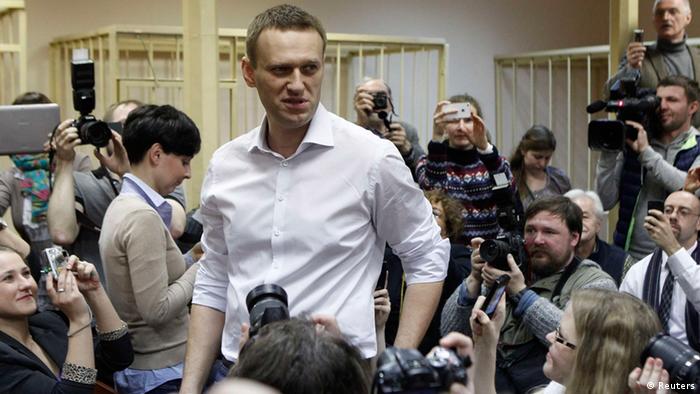Germany's Commissioner for German-Russian Coordination, Andreas Schockenhoff, in an interview with DW, criticizes the trial against Russian blogger Alexei Navalny and fines imposed on NGOs.
DW: Russian independent election monitor Golos has been fined 300,000 rubles (7,500 euros/ $9,700) for failing to register as a "foreign agent." A new Russian law makes it mandatory for organizations to register if they receive foreign funds. What do you make of this fact?
Andreas Schockenhoff: We were afraid this mechanism would be applied. Now we have to see whether tighter sanctions will follow if they can't pay this fine - especially sanctions against the head of Golos, Liliya Shibanova, who is doing a great job. We hope she is able to profit from international solidarity and that she will get the chance to fight against this penalty in a fair trial.
Another trial in Russia has led to protests. The well-known blogger Alexei Navalny has been put on trial. How do you assess his lawsuit?
I fear the trial against Navalny is going to be a show trial against civil society. I hope it will be very transparent and open and that he has every possibility to defend himself against what he's accused of. I fear the [real] motives for this process are different to the ones given in the charge. There have to be clear principles reflecting the rule of law, so that Navalny is considered innocent until proven guilty.
What do you think of Navalny? Is he a promising Russian opposition figure?
I can't fully assess his character by meeting him a couple of times. It would probably be a very biased assessment if I were to do that. But it's not just about Navalny - it's about the quality of Russia's rule of law and clear principles of checks and balances. It's about independent courts that can act without political instructions, without receiving signals from the government to tell them what's expected of them.
It's about a person, sure, but it's also about a principle: the principle of the rule of law. That's why I can only call on Russia's courts to conduct this trial in an independent manner and in accordance to the rule of law.
Let's talk again about NGOs in Russia where German foundations were raided a couple of weeks ago, just before Putin's visit to the Hanover trade fair. Do you think this was simply a coincidence or a well-hatched plan?
I don't think this was scheduled to coincide with the trade fair in Germany. This action didn't intend to target German foundations. It was aimed at Russian citizens. They were explicitly told: The political power in Russia regards voluntary, civil collaboration with foreign partners as a threat. But in fact, a modern, competitive state needs civil commitment. So this message was aimed against the future of the Russian state and society.
Does it make sense for German foundations to keep working in Russia? Or should they decide to quit?
No, of course it makes sense for them to stay. Our partners are the Russian administration, Russian parliaments - the Duma and regional parliaments. But our partners are also non-governmental organizations. That's public engagement at its best. The exchange of knowledge, political education in the broader sense, is an important goal. That doesn't just include certain parts of Russian society.
There are different opinions in Germany on how one should deal with Russia: Either to explicitly address democratic deficits, or to trust silent diplomacy tactics and put hopes in Russia's evolution as some of the business elite put it. What's your take on that?
I think it's a good thing that we have different point of views here in Germany. By the way, there is also quite a controversial discussion going on within the business sector. Because civil society - an active, creative general public geared to checks and balances when competing with each other - is also of vital interest when it comes to economic cooperation with Russia. A modern society is an open society that depends on citizens as partners to shape a country in a modern and competitive way. dw de


No comments:
Post a Comment